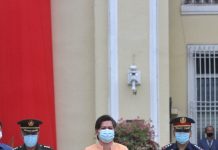by Lorie Ann A. Cascaro
TAXI operators in Davao City await the decision of the Land Transportation Franchising and Regulatory Board (LTFRB) national office on their petition to exempt the city from the nationwide and across the board taxi fare increase filed before LTFRB 11 by the Metro Davao Taxi Operators Association (MDTOA).
And no less than Benjamin A. Go, the newly assumed LTFRB regional director in the Davao Region, has joined the taxi operators’ petition.
Being opposed is LTFRB Case No. 2010-0295, granting the petition of the Philippine National Taxi Operators Association (PNTOA), “The fares of public utility taxicabs for Metro Manila and the Provinces shall be increased from P30 to P40 for the first 500 meters and from P2.50 to P3.50 for the succeeding 300 meters or two-minute waiting time.”
Meanwhile, an independent entity and separate from PNTOA, the MDTOA is amenable only to three pesos (P3.00) increase for every succeeding 300 meters, opposing the three pesos and fifty centavos (P3.50) stated in the LTFRB order.
After having a meeting with MDTOA last January 4, LTFRB 11 regional director, Go filed a briefing memorandum to his bosses in LTFRB national board, requesting exemption of Davao City from the order.
“The situation/condition prevailing in Davao City is exactly similar to that in Baguio City, which was exempted and excluded from the order,” his memo states.
The LTFRB order was issued last December 23 and will take effect 15 days following its publication in a newspaper of general circulation.
If the publication was done on January 5, the order will be valid on January 20, Go said Wednesday during the Club 888 Forum at the Marco Polo Davao.
Prior to the granting of the petition filed by PNTOA on January 22, 2010, the national board conducted several hearings for petitioners to prove their grounds for fare increase. Evidences were submitted that the cost of fuel, spare parts, vehicle maintenance, labor and living allowance have all increased since the last approved taxi fare hike in September 2004.
“The pumped price of unleaded gasoline during the last fare hike in September 2004 was P26.43 per liter and has almost doubled to P45.72 as of March 2010; while the cost of LPG has increased from US$ 369.90 per metric ton in 2005 to US$ 727 in 2009;
“The price index or inflation rate has increased from P100 in 2005 to P132 in 2009; the cost of tires in July 2004 was on P1,200, and increased to P1,530 as of February 2010; the price of car batteries has likewise increased from P1,200 to P1,700.
“Moreover, the cost of living, including food, clothing, shelter, power, education, medical treatment, and hospitalization, has increased since 2004.”
On the other hand, Go said Davao City is exempted from the taxi fare hike for various reasons, such as having low cost of living compared to Metro Manila and other provinces, and seldom traffic congestion.
Go told reporters that taxi operators, especially small individual operators, will have difficulty to comply with the order due to expenses. He said calibration of taxi meters, which is done only by accredited private calibration centers, costs about P500 per unit.
“Duka ka klase ang taxi sa Davao,” he said, one has the old meter and the other has the new meter; the latter rates higher than the former.
Curiously, LTFRB order neither indicate a deadline for implementation, nor state a penalty for non-compliance. Go said he expected his office to be bombarded with complaints from some of 3,700 taxi cabs in the city.
“Kung naay mo-implement sa increase pero wala nagasunod sa order (terms and conditions), kasuhan nako og overcharging or ipa-cancel ang franchise,” Go said.
The LTFRB order says that all franchise taxi operators in Metro Manila and the provinces are deemed to have individually applied for an increase of rate and shall pay to the board the corresponding filing fee of P510 per case number.
Their taxi meters shall be tested and sealed by the LTFRB, and they shall pay the corresponding sealing and testing fee of P500 per unit pursuant to Department Order No. 2004-50.
Operators and/or their personnel are not allowed to charge the increase of fare until the taxi meter is tested and resealed accordingly. (Lorie Ann A. Cascaro)






